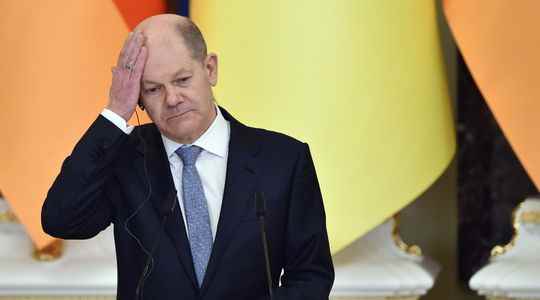What happened to Olaf Scholz? On December 8, 2021, at the end of a campaign in which he had defied all predictions, he was elected Chancellor of Federal Germany, appearing as an unexpected savior of social democracy in Europe, after sixteen years of Angela’s reign. Merkel and the gradual decline of the two major parties of right and left, CDU and SPD. He took the lead of a motley coalition, with the Greens and the Liberals, which upset the usual alliances and promised Germany’s entry into a new era, focused on ecological transition, social cohesion and a political commitment to the international scene which is no longer guided solely by its economic interests.
After Merkel, who had established the prosperity of Europe’s leading economic power at the price of a compromise with Vladimir Putin’s Russia and Xi Jinping’s China, he would be the active partner for “European sovereignty” and a common defense that France would ‘Emmanuel Macron was waiting. Putin’s war in Ukraine was to be the moment of this assertion. After a difficult start, his speech on February 27 in the Bundestag, announcing the shipment of arms to Ukraine and a massive reinforcement of the Federal Republic’s military budget, marked a historic change in German policy. The abandonment of the Nord Stream 2 gas pipeline project linking Russia to Germany was part of this radical shift.
Contradictory injunctions
But the Scholz moment deflated. The new German, who promised a “change of era”, remained mired in his procrastination. If he agreed to send the Ukrainians heavy equipment (armoured vehicles, artillery pieces), it was only through the intermediary of other NATO countries – for fear, he said, of provoking a nuclear response of the Russian President. On April 7, the economist Paul Krugman devoted his chronicle of New York Times to ferociously pin down that Germany once so intractable in demanding sacrifices from Greece ten years ago, and so “reluctant to make moderate sacrifices, even when faced with war crimes”.
On April 27, a new turn: under pressure from public opinion and the media, the German government suddenly decided to announce the export to Ukraine of around fifty Gepard tanks, high-performance anti-aircraft armored vehicles… but difficult to use, as if he wanted both to calm down his coalition and not to anger Putin. The conservative opposition was amused by this “smokescreen”. The Ukrainians did not spare him. On May 3, the chancellor was bluntly taken to task by the insolent Ukrainian ambassador to Berlin, Andrij Melnyk. “Making sausage is not very worthy of a statesman”, had mocked the diplomat about the chancellor who refused to go to kyiv after the refusal of the Ukrainian authorities to welcome the president of the republic Frank- Walter Steinmeier – they later referred to a misunderstanding. What zigzags!
How to embody the “new Germany” when one represents, like Steinmeier, a social-democratic party imbued with a strong pacifist ideology and a policy of outstretched hands with regard to Russia, stemming from that what did former SPD Chancellor Willy Brandt advocate for the USSR? How can you get out of Merkelism when you have been minister and vice-chancellor of Angela Merkel, and you have participated in the same naive dream, with Putin as with Xi, from Wandel durch Handel (transformation through trade)? How can we get out of dependence on Russian gas when we ourselves have supported the decision to phase out nuclear power and vigorously supported the Nord Stream 2 project? How to oppose the master of the Kremlin when one had as a mentor Gerhard Schröder, the former SPD chancellor, now paid by the Russian state?
Olaf Scholz is struggling to find his place, embarrassed by contradictory injunctions. On the one hand, his European and Atlantic Alliance partners, as well as the Greens and Liberals in his coalition, are pushing him in the direction of kyiv’s demands. On the other hand, Germany’s past and that of the German Social Democratic Party lead him to caution. He has already reduced his imports of Russian gas from 55% to 35% of the total, but the Chancellor who promised ‘era change’ can no longer continue to be one of the main financiers in Europe of Putin’s war . The Merkel years were those of a world without war, softened by trade, under American protection. The Scholz years will have to put an end to this German dream.
